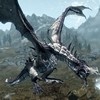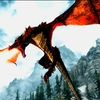We have a fairly good idea of which words in the language relate to one another. What's uncharted territory is how these words might relate to real languages. Below we'll look at a handful of canon words and how Bethesda may have come up with them.
It goes without saying that much of what follows is speculation. Some origins are more speculative than others. I chose words that are either obvious or interesting. I also focused on languages that Dovahzul was likely inspired by, such as Icelandic, German, and Old English.
Wiktionary is my weapon of choice and I would highly recommend it for etymology on any language.
Words & Possible Origins
Ag "burn" : possibly from Sanskrit agni "fire."
Ahrol "hill" : possibly from Icelandic hóll.
Alok "rise" : English aloft, see also the possible origins of lok.
Aus "suffer" : possibly from the German interjections au, aua, and autsch, which are related to the more familiar English interjections ow and ouch.
Bron "nord" : could be a reverse spelling of "nord," if you also flip the "d" to a "b."
Dez "fate" : possibly a truncated form of the English destiny.
Do "of/about" : from de "of/from" in many languages including Latin, French, Irish, and Portuguese. German equivalent der / des.
Dok "hound" : English dog, Old English docga.
Fel "feral" : English fell, Old English fel "strong, fierce, terrible, cruel."
Fus "force" : English force, Middle English furs.
Gaaf "ghost" : Old English gÄst.
Gahrot "steal" : a reference to the character Garrett of the Thief series. See also the origin of tafiir.
Gein "one" : German ein.
Geh "yes" : Old English Ä¡Ä“a "yes, thus, so," origin of German ja and English yeah.
Gram "cloud" : name of the sword in Norse mythology which Sigurd uses to kill the dragon Fafnir.
Hahkun "axe" : possibly from French hache.
Kaaz "cat" : German Katze.
Kiin "born" : English kin and possibly German Kind "child."
Kiir "child" : possibly German Kind and Kinder.
Kopraan "body" : German Körper.
Kras "sick" : German krank.
Krif "fight" : possibly from German Krieg "war."
Laan "want/request" : Icelandic langa "to want/desire," origin of English word long ("to long for").
Lok "sky" : Old Norse lopt, Dutch lucht, English loft.
Mal "little" : possibly English small, or Russian малый (mályj) "small, little."
Mindok "know" : possibly from English mind.
Mun "man" : English man.
Rovaan "wander" : English rove.
Saviik "savior" : English save.
Sil "soul" : English soul, German seel.
Strun "storm" : English storm, German Sturm.
Tafiir "thief" : a reference to the invented word taffer featured in the Thief series. See also the origin for gahrot.
Tey "tale" : English tale.
Tiid "time" : Old English tīd, origin of the English word tide.
Ven "wind" : English wind, Swedish vind, Latin ventus.
Viing "wing" : English wing, Swedish/Danish vinge.
Voth "with" : English with.
Wol "oak" : perhaps from English weald, Norwegian voll "forest."
Wundun "travel" : possibly from English wander and German wandern.







